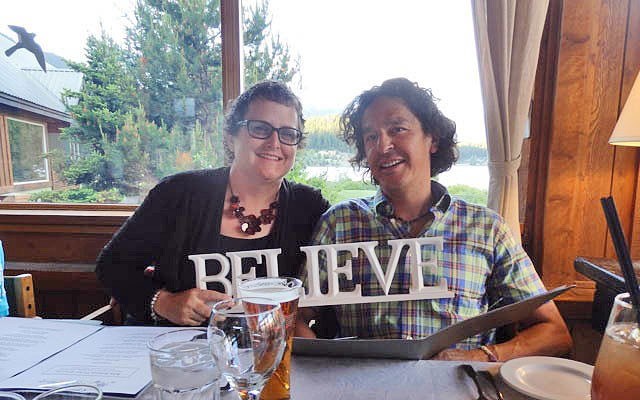You can't wrap cancer up in a pretty pink ribbon.
Patricia Stoop knows that more than anyone else.
For four years she's been living with metastatic breast cancer — cancer that began in her breast and spread.
These past four years have been about chemo treatments, trying new drugs, finding inner strength she never knew she had, relentless nausea, endless worry, fear, aches and pains in her bones.
There has been nothing pink or pretty about her cancer.
And so, in the thick of Pinktober — Breast Cancer Awareness Month is every October during which there is a push to raise funds and awareness of the disease — Stoop has her own message about all things pink — pink candy, pink toilet paper and yes, even 1,000 pink drill bits from a fracking company this year.
It's called More Than Pink 2 (check it out on YouTube by searching More Than Pink 2).
It's a follow up from last year's gritty, honest, real video, More Than Pink.
"Each person with cancer has their own thoughts on what awareness means to them," said Stoop.
The video highlights what "real cancer awareness" is from people who have the disease. It's:
• "knowing that cancer doesn't end at remission;"
• "loss;"
• "sometimes miracles;"
• "telling it like it is without skipping the hard stuff."
The hard truth about metastatic breast cancer means that Stoop will be in treatment for the rest of her life.
"When you have metastatic you can't be cured," she said on Monday Oct. 13, the first National Metastatic Breast Cancer Awareness Day in Canada. "You are eventually going to die from your cancer."
Stoop gets chemo treatment in Squamish every three weeks. She feels nauseous all the time. Every three months she gets a CT scan to see if her cancer is back.
The past two scans have been clear — no evidence of the disease, which was in her liver.
"You're always wondering what your scan is going to say," said Stoop.
"You live your life scan to scan.
"It was only recently, this summer, that I started to live beyond scan to scan."
This is real cancer awareness.
And yet, she knows that Pinktober has raised the profile of breast cancer, and critical funds.
"I can't complain because of all the awareness and all the focus on it, I am on medications that keep me alive and they probably wouldn't have existed if we didn't have such a big push for Pinktober," she said.
Stoop is on a new drug called Perjeta.
Last year Whistler rallied to raise funds to help pay for her treatment, which was not covered in B.C. and cost $3,600 every three weeks.
Weeks after the fundraiser, the BC Cancer Agency confirmed it would fund the drug. It has been playing a key role in keeping Stoop's cancer at bay.
The last she read up on the drug, it was increasing the mean survival time by 16 months, a compelling statistic given that the majority of those diagnosed with metastatic breast cancer will die in three to five years.
"It's changing statistics," said Stoop of the drug. "To improve the lifespan by more than a year is just amazing. And Perjeta does that."
During Pinktober, Stoop would like people to think beyond pink, beyond the gimmicks.
No one dies from breast cancer that remains in the breast. Metastasis happens when the cancerous cells travel to a vital organ.
And the statistics remain: 20 to 30 per cent of people initially diagnosed with early stage disease will develop metastatic breast cancer.
"That has not changed since the dawn of new treatments," said Stoop.
"They don't know how to stop it."




